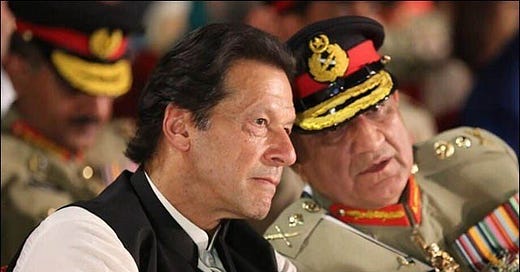Can Khan make the Pakistan army great again?
Evidence from the U.S. elections suggests that constituents' views can change dramatically once their side is in power.
Ever since Trump lost the 2020 elections, Republican voters by and large have expressed the view that elections in the country were not secure. They also constantly told pollsters that the economy was terrible and that the Biden administration had failed to bring about a meaningful change when it came to pocketbook issues.
Biden is still president and not much has changed from a structural perspective since Trump won the 2024 elections. What has changed, however, is how Republicans perceive the state of the economy and the security of elections. Per Politico:
The vibes have officially shifted.
The economy Donald Trump said was broken? All it took was him winning, and consumer sentiment among Republicans soared.
Elections? Suddenly Republicans are on board with the reality that they’re secure. House Speaker Mike Johnson said he saw no evidence of fraud in the 2024 campaign.
Democrats’ view of the economy, however, have soured since the elections:
At the same time, Democrats’ sentiment of the economy — essentially how they view its overall health — dropped by 13 percent after Trump’s win.
Much of this can be explained by the polarization of the electorate, where people view things from a partisan lens and as a result believe that things are awful when their side is out of power, and feel thrilled when their side wins.
These developments in the United States made me think about what is going on in Pakistan these days when it comes to the overall popularity of the Pakistan Army. It is no secret that the institution’s leadership has constantly intervened in the politics of the country, both overtly and covertly. In 2018, the Army was on the proverbial same page with Mr. Khan and his party, and as a result broad swathes of the Insafian ecosystem loved the military. Others, especially the PML-N, were on the receiving end at that time and so did not appreciate the military’s interventions in politics.
The script flipped after Khan was ousted from power. Since then, the military has continued to see a dramatic erosion of its support across much of Pakistan, especially in Khyber-Pakhtunkhwa and Punjab. This erosion of support is strongest in parts of the country where Mr. Khan and his party are popular, with constituents angry at the ways in which the military has backed a government that has come to power through rigged elections. Hyperactive segments of the Pakistani-American diaspora also are vocal critics of the Pakistani armed forces.
For many of us who follow the ebbs and flows of Pakistani politics, the question is whether this decline in the army’s popularity will be a constant feature moving forward.
Many of my friends believe this to be the case, but I for one have been skeptical.
After all, it’s not as if Mr. Khan and his party are ideologically opposed to the military’s role in politics. This is what Mr. Khan has said about using the military and its coercive power in the past:
Unfortunately, I had a weak coalition government. So, the moment I used to go after the powerful, the problem used to be to keep my majority intact. And we could only keep our majority intact by telling the army, the ISI, look, you must make sure that they come, my members appear for voting.
Many Insafians who I speak with still suggest that there is nothing wrong with using the military to achieve political goals provided it in the country’s interests. The catch, of course, is that it is Mr. Khan and the PTI who have the right to define what these interests are, and so long as that is the case, there should be no issue in using the armed forces to achieve certain objectives, including managing politics across the country.
Some who I speak to within the Insafian ecosystem also suggest that while they have the constitutional right to protest for their rights, other groups such as teachers in Khyber Pakhtunkhwa, for example, are a problem and therefore deserve a good old beating when they come out on the streets.
Much like the PML-N, the PTI’s core argument about democracy seems like just a hollow slogan. I do not think its leaders truly believe in any meaningful security sector reforms that would constrain the armed forces’ role in the country’s political economy; if they did, we’d know what the blueprint of those reforms looks like.
Which leads me to believe that if and when Mr. Khan returns to power - of course through a deal with the military - he will help make the Pakistan Army great again.
After all, if Mr. Khan knows what is best for the country, then his voters will not have any qualms about the military using its power to help Mr. Khan achieve his goals. At that point in time, we may see a recovery in the institution’s standing amongst Insafians, while the other side would end up occupying the PTI’s anti-establishment space in politics.





‘‘Cheating Eyes Wear No Veils.’’
Gosh, it's like the same script is running over and over agin 🤦